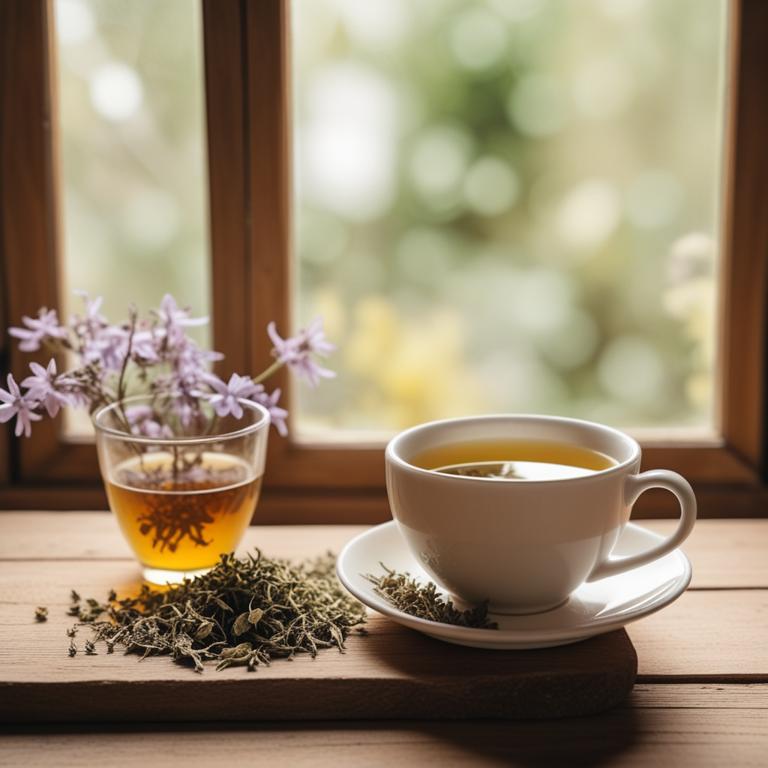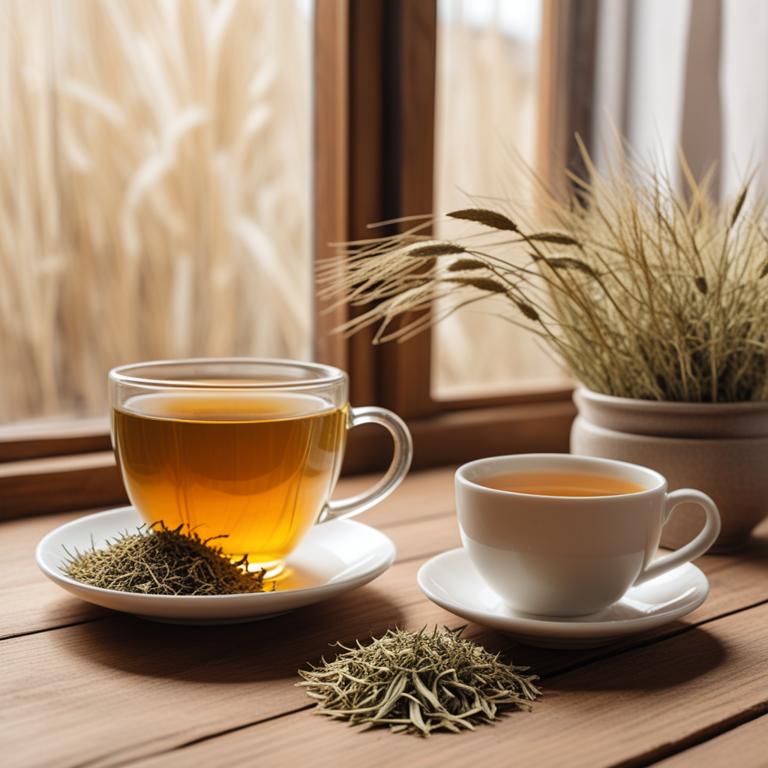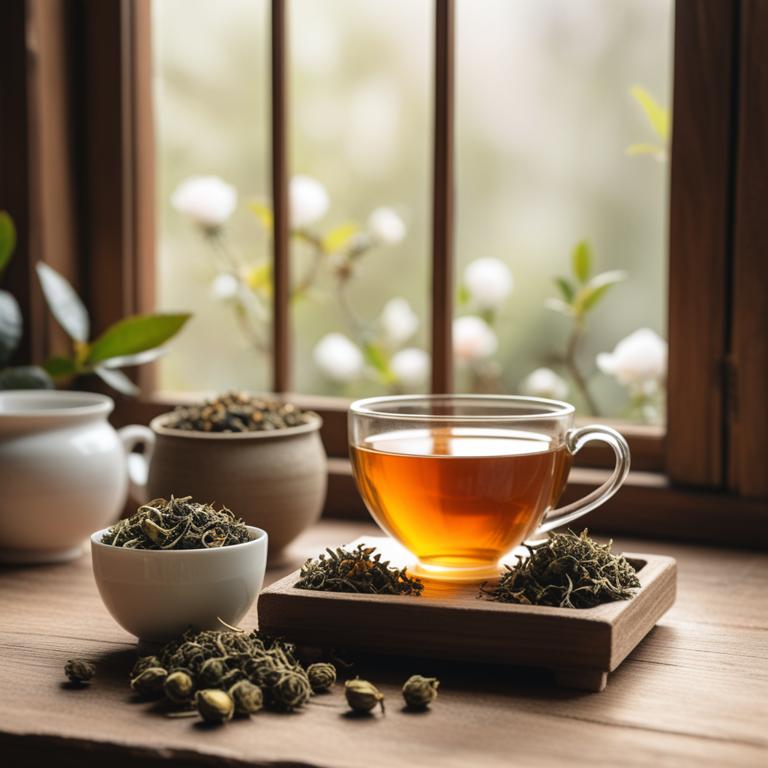7 Herbal Teas For Oily Hair

Herbal teas can be a great way to help manage oily hair.
These teas are made from herbs that have natural properties that help to balance the scalp's natural oil production. When you drink herbal teas, the active ingredients are absorbed into your bloodstream and eventually make their way to your scalp. This can help to reduce the amount of oil your scalp produces, leading to less oily hair. Let's take a look at a few examples of herbs that can help with oily hair. Rosemary (Rosmarinus officinalis) is one of these herbs. Rosemary has been shown to improve circulation to the scalp, which can help to reduce oil production. It also has antimicrobial properties, which can help to prevent bacterial buildup on the scalp. Lavender (Lavandula angustifolia) is another herb that can help with oily hair.
Lavender has a calming effect on the scalp, which can help to reduce stress and anxiety that can lead to oily hair. It also has antifungal properties, which can help to prevent fungal infections on the scalp. Another herb that can help with oily hair is lemongrass (Cymbopogon citratus). Lemongrass has a natural astringent property that can help to dry out the scalp and reduce oil production. It also has antiseptic properties, which can help to prevent bacterial infections on the scalp. Drinking these herbal teas can bring some great benefits to your life. Not only can they help to manage oily hair, but they can also help to improve your overall health and wellbeing. Many of these herbs have anti-inflammatory properties, which can help to reduce stress and anxiety.
They can also help to improve your sleep quality and boost your immune system.
- 1. Rosmarinus officinalis
- 2. Lavandula angustifolia
- 3. Cymbopogon citratus
- 4. Thymus vulgaris
- 5. Melissa officinalis
- 6. Camellia sinensis
- 7. Saponaria officinalis
1. Rosmarinus officinalis

Rosmarinus officinalis teas contains rosmarinic acid, a compound that helps balance the scalp's natural oil production.
This essential oil also possesses anti-inflammatory properties, which reduce redness and irritation that can contribute to oily hair. Additionally, rosmarinic acid has a natural astringent effect, helping to regulate sebum production and minimize oiliness. The tea's antiseptic properties also help to prevent the growth of bacteria and fungi on the scalp, which can exacerbate oily hair.
By consuming Rosmarinus officinalis teas, individuals can potentially experience a reduction in oily hair due to its ability to regulate sebum production and prevent scalp irritation.
- Gather 1 cup of boiling water and 2 teaspoons of dried Rosmarinus officinalis leaves.
- Steep the leaves in the boiling water for 5-7 minutes.
- Strain the liquid using a tea strainer or a fine-mesh sieve into a cup.
- Let the tea cool down before use. Use it as a final rinse after shampooing your hair.
- Repeat the process 1-2 times a week for best results on oily hair.
2. Lavandula angustifolia

Lavandula angustifolia teas contains linalool and linalyl acetate, which are active constituents that help to balance the scalp's oil production.
These compounds have a drying effect on the scalp, reducing the amount of oil that is produced and helping to control greasiness. The antiseptic properties of linalool and linalyl acetate also help to prevent the buildup of bacteria on the scalp, which can contribute to oily hair. Additionally, these compounds have a cooling effect, which can help to reduce inflammation and irritation that can exacerbate oily hair.
By reducing oil production and preventing bacterial buildup, Lavandula angustifolia teas can help to promote a healthier scalp and reduce the appearance of oily hair.
- Gather 1 cup of boiling water and 1 tablespoon of dried Lavandula angustifolia flowers.
- Steep the flowers in the boiling water for 5-7 minutes.
- Strain the mixture and let it cool down.
- Use the cooled tea as a final rinse after shampooing your hair.
- Leave the tea on your hair for 1-2 minutes before rinsing with cold water.
3. Cymbopogon citratus

Cymbopogon citratus teas contains bioactive constituents such as geraniol, limonene, and linalool, which are known for their ability to control oil production in the scalp.
The antifungal and antibacterial properties of these compounds help to reduce the presence of yeast and bacteria on the scalp, which can contribute to oily hair. Geraniol, in particular, has been shown to inhibit the activity of 5-alpha-reductase, an enzyme that converts testosterone to dihydrotestosterone (DHT), a hormone that can contribute to oil production and hair loss. The anti-inflammatory properties of Cymbopogon citratus teas may also help to soothe an itchy scalp and reduce inflammation, which can exacerbate oily hair.
By reducing oil production and promoting a healthy scalp environment, Cymbopogon citratus teas may help to balance oily hair and prevent greasiness.
- Gather 1 cup of fresh Cymbopogon citratus leaves or 2 tablespoons of dried leaves.
- Combine the leaves with 1 cup of boiling water in a heat-resistant cup or teapot.
- Steep the mixture for 5-7 minutes, then strain it into another cup.
- Let the tea cool down to room temperature. Store it in the fridge for up to 24 hours.
- Shampoo your hair as usual, then rinse it with the Cymbopogon citratus tea as a final rinse to balance your scalp's pH.
4. Thymus vulgaris

Thymus vulgaris teas contains a significant amount of thymol, carvacrol, and borneol, which are powerful essential oils that can help control oily hair.
Thymol, in particular, has antiseptic and astringent properties that can help reduce the production of sebum, the oily substance produced by hair follicles. Carvacrol, on the other hand, has antioxidant properties that can help protect the scalp from damage caused by free radicals, which can contribute to oily hair. Borneol's antiseptic properties can also help prevent bacterial and fungal infections that can lead to oily scalp conditions.
By using Thymus vulgaris teas, you can create a scalp-friendly environment that promotes healthy hair growth and reduces oil production.
- Gather 1 cup of fresh Thymus vulgaris leaves or 2 teaspoons of dried leaves.
- Heat 1 cup of water in a pot until it boils.
- Add the Thymus vulgaris leaves to the boiling water and let it steep for 5-7 minutes.
- Strain the tea into a bowl and discard the leaves. Let it cool down.
- Shampoo your hair as usual, then rinse with the Thymus vulgaris tea as a final rinse to help balance oil production.
5. Melissa officinalis

Melissa officinalis teas contains active constituents like linalool, linalyl acetate, and borneol.
These compounds help to regulate the scalp's oil production, reducing the amount of sebum that reaches the hair. Linalool, in particular, has antiseptic and anti-inflammatory properties, which can soothe an itchy scalp and prevent irritation that can lead to oiliness. By reducing inflammation and regulating oil production, Melissa officinalis teas can help to balance the scalp's natural moisture levels, resulting in less oily hair.
Regular consumption of Melissa officinalis teas can promote a healthier scalp and more manageable hair.
- Gather 1 cup of fresh Melissa officinalis leaves or 1 tablespoon of dried leaves.
- Heat 1 cup of water in a pot and bring it to a boil.
- Add the Melissa officinalis leaves to the boiling water and let it steep for 5-7 minutes.
- Strain the tea into a cup and discard the leaves.
- Use the tea as a final rinse after shampooing to help balance your scalp's oil production.
6. Camellia sinensis

Camellia sinensis teas contains tannins and catechins, which are powerful antioxidants that help balance the scalp's natural oil production.
These compounds also have astringent properties, which can help tighten the hair follicles and reduce oil secretion. Tannins, in particular, are known to reduce the size of pores, allowing the hair follicles to breathe and function more efficiently, leading to healthier and less oily hair. Additionally, Camellia sinensis teas contains flavonoids, which have anti-inflammatory properties that can help soothe an itchy scalp and reduce irritation.
By regulating the scalp's natural oil production and reducing inflammation, Camellia sinensis teas can help keep oily hair under control.
- Gather Camellia sinensis leaves (green tea leaves) and 1 cup of boiling water.
- Steep 1 teaspoon of Camellia sinensis leaves in the boiling water for 3-5 minutes.
- Strain the tea leaves and let the tea cool down to room temperature.
- Use the cooled green tea as a final rinse after shampooing your hair to help balance its pH and reduce oiliness.
- Shampoo and condition your hair as usual after the final rinse to enjoy the benefits of Camellia sinensis tea for oily hair.
7. Saponaria officinalis

Saponaria officinalis teas contains saponins, flavonoids, and phenolic acids as its bioactive constituents.
These compounds have antioxidant and anti-inflammatory properties that help balance the scalp's natural pH and reduce oil production. Saponins, in particular, have been shown to inhibit the activity of 5-alpha-reductase, an enzyme that converts testosterone to dihydrotestosterone, a hormone that contributes to oily hair. By reducing DHT levels, saponaria officinalis tea can help slow down hair follicle clogging and promote a healthier scalp.
This can lead to a decrease in oil production and a reduction in greasiness, making it a potential natural remedy for oily hair.
- Gather 2 cups of fresh Saponaria officinalis leaves and flowers. Clean them with water.
- Steep 1 cup of the cleaned Saponaria officinalis in 2 cups of boiling water for 5-7 minutes.
- Strain the mixture through a fine-mesh sieve into a cup. Discard the solids.
- Let the tea cool down. Use 1/2 cup of the cooled tea as a final rinse after shampooing your hair.
- Repeat the tea rinse 2-3 times a week for oily hair. Store the remaining tea in the fridge for up to 3 days.